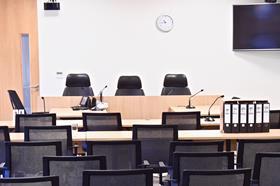A legal aid solicitor who could not prove her firm made hospital visits claimed for has been struck off the roll.

The Solicitors Disciplinary Tribunal said Betty Forde showed a ‘profound failure to take the basic necessary steps’ required of her, conducting her practice with ‘total disregard’ to Solicitors Regulation Authority rules.
The tribunal found that Forde submitted claims to the Legal Aid Agency for payment which could not be verified by supporting evidence. There was no basis to suggest that her conduct would be any different after a period of suspension and she was struck off to protect the public and the reputation of the profession.
Forde, admitted in 2013, was sole practitioner with east London firm Anchor Legal before it was shut down by the SRA in 2023. She did not attend the SDT hearing which went ahead in her absence.
She had been reported to the regulator by the LAA after it had terminated the legal aid contract in 2021. The contract was ended on the basis of the quality of work and the lack of evidence that work was done. SRA investigators going into the firm found no central record of invoices, client funds mixed with business monies, no adequate record of what funds belonged to each client and disbursements not adequately recorded as being due or paid.
The SRA told the tribunal that Forde showed a ‘wide-ranging failure’ to operate the firm. Forde had previously submitted that she was unable to provide an explanation due to ill health and her accountant’s failure to provide necessary information.
The tribunal found Forde had failed to safeguard and record client money and did not administer and return monies to all clients. It added: ‘The ongoing inability to rectify and remedy these serious breaches of the rules to ensure compliance was a comprehensive failure to meet fundamental professional obligations which could only be described as manifest incompetence.’
On the legal aid issue, the LAA calculated that there was insufficient evidence for claims of more than £4,200 on five mental health matters. In the case of one client, nine of the 10 purported hospital visits could not be verified.
The tribunal heard that Forde had offered to repay the sums identified by the LAA and accepted there were shortcomings. She submitted that some visits were made without it being recorded, and she blamed a supervisor employed by the firm for the failings.
The tribunal said it was her responsibility to make sure claims were appropriate and valid.
The ruling added: ‘If a proper review had taken place, as demonstrated by the outcome of the LAA’s own inspection and enquiries, it would have been apparent to the respondent that the explanations given for the attendances could not be accurate.’
Forde was struck off and ordered to pay £65,000 costs – reflecting the five visits required by investigators because of the difficulties in obtaining information.






























